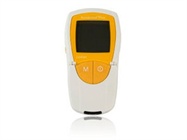Featured Article

Please check out our Clinical Diagnostics section or Point of Care Diagnostic Devices section to find manufacturers that sell these products
With the exception of 1918, when influenza was the leading cause of death in the United States, cardiovascular disease (CVD) has had that honor for the last 100 years. CVD is also the leading cause of death worldwide. According to the World Health Organization, about 17.3 million people died from some form of CVD in 2008, and about 80% of deaths occurred in low- and middle-income countries, affecting men and women almost equally.
Lipid Analysis for CVD Risk Assessment
The determination of blood lipid levels is important for monitoring the risk of CVD. Cholesterol, and two of the lipoproteins that transport it in the circulation (low-density lipoprotein [LDL] and high-density lipoprotein [(HDL]), along with triglycerides, are thought to be the most important lipids for risk assessment. Perhaps no other commonly determined medical laboratory values are so much in the public eye as serum or plasma levels of “good,” “bad,” and total cholesterol (TC), making the discussion of lipid test results an opportunity for effective patient counseling and therapeutic intervention.
As with so many other diagnostic procedures that had previously only been performed by clinical laboratories, kits and devices to determine LDL-cholesterol (LDL-C), HDL-C, TC, and triglyceride levels now enable inexpensive, accurate, reimbursable, easily used, and rapidly performed testing. Some of these products are CLIA-waived, making their use a practical enhancement of care for point-of-care settings like physicians’ offices and clinics.
- Alere (Waltham, MA) offers the CLIA-waived Alere Cholestech LDX® System, which uses enzymatic methodology, solid-phase technology, and reflectance photometry to measure a range of lab values from small samples (35–40 μL) of venous or fingerstick whole blood (CLIA-waived), or plasma or serum. The Alere Cholestech LDX System consists of a tabletop analyzer (8¼" × 4"), starter pack of test cassettes, power supply, small printer, optics check cassette, user manual, and training video. Test cassette options include the lipid profile (TC, HDL-C, triglycerides); lipid profile and glucose level; TC and HDL-C; TC, HDL-C and glucose; TC; TC and glucose; and liver enzyme levels (alanine aminotransferase, and aspartate aminotransferase). The Lipid Profile cassettes also calculate the TC/HDL-C ratio and non-HDL-C, and estimate the level of LDL-C. Results are available in 5 min. An additional cassette testing high-sensitivity C-reactive protein (hsCRP) can also be used with this system. However, the hsCRP test is moderately complex. This test uses serum or whole blood samples (40 μL and 50 μL, respectively), and the results are available in 7 min.
- Polymer Technology Systems, Inc. (Indianapolis, IN) produces the FDA-cleared, CE-marked, CLIA-waived Professional CardioChek® PA Test System, which consists of the CardioChek analyzer, test strips, and a MEMo Chip®. The handheld, battery-powered device is one of several manufactured by the company that use proprietary test strips and a reflectance photometry processor to perform a wide range of in-office tests on a single fingerstick whole blood sample (15–40 μL). Test strip options include a lipid panel (TC, HDL-C, and triglycerides); TC, HDL-C, and glucose; HDL-C, triglycerides, and glucose; cholesterol and glucose; and cholesterol and HDL-C. The lipid panel calculates LDL-C and the TC/HDL-C ratio. Individual tests for TC, HDL-C, triglycerides, and glucose are also available. Each vial of test strips contains a MEMo Chip that has information on specific calibration and on how to read the particular test strip. Results are available in 2 min. The device can be linked to computers, and is compatible with Windows® 7/Vista™/XP operating systems.
- Roche Diagnostics Corporation (Indianapolis, IN) offers the Accutrend® Plus System to measure TC or glucose using specific test strips. The tests are based on enzymatic reactions. The next-generation battery-powered meter uses reflectance photometry on fresh capillary blood (15–50 μL) that has been applied to the test strip. This simple CLIA-waived test provides total cholesterol results in 3 min and glucose results in 12 sec.
Given the convenience and flexibility, clinical importance, and value to patients of this type of testing, it appears that point-of-care assessment of blood lipid values will continue to expand as a part of routine patient care. Evaluations of the accuracy of these tests in clinical practice, and of the degree of treatment compliance resulting from point-of-care versus laboratory testing, will also continue.
Please check out our Point of Care Diagnostic Devices section to find manufacturers that sell these products